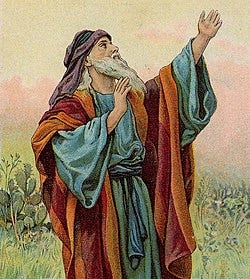The Hard Sayings: Mark 6:4
A prophet is not without honor except in his own town, among his relatives and in his own home.
This article is part of a series explaining the sayings of Jesus that are hard to understand. This list was put together by the Lord's Library. To see the list of hard verses, explained and awaiting explanation, go to this page.
The context for this verse is that Jesus visited Nazareth and taught at the meeting house there. The locals wonder at his learning and his ability to do mighty works. They remembered him as a carpenter, growing up and working there. They were confused. Mark refers to them as being “tripped up” by this new Jesus. Jesus answered them with Mark 6:4:
NIV: A prophet is not without honor except in his own town, among his relatives and in his own home.
The words in boldface are those that are discussed in this article. The humor in this verse is in the phrasing of the ending, but we will come to that at the end of this article.
A Prophet
This verse is unique in that it is the only one in which Jesus alludes to himself as a “prophet.” Though he doesn’t say that he is a prophet directly, this verse strongly suggests it. After John the Baptist denied that he was the Christ and Elijah, John was specifically asked if he was “that Prophet” (John 7:16). This may have been a referral to Deuteronomy 34:10, which promised a future prophet who, like Moses, would know God “face to face.” Later prophets could not gaze upon the face of the Divine.
We should know that our modern understanding of the word “prophet” is very different than the word’s meaning at the time of Jesus. Back then, the Greek word meant a “spokesperson for the Divine.” Jesus used this word to refer not only to Judean history’s divine spokespeople but their books in the Old Testament. The Greek word wasn’t only used by the Judeans. It was also used in Egypt to refer to the highest level of priesthood who were seen by the Egyptians as spokespeople for their gods. The word “prophet” itself is the Greek word, prophetes, adapted into the English as prophet. It was initially adopted into Latin as propheta, from the Latin Vulgate version of the Bible.
However, unlike our word, the Greek word did not mean someone who sees the future and makes prophecies. One making prophecies is a different Greek word that we translate as “oracle” as in the Oracle of Delphi. Prophets as predictors of the future is a Christian idea because Jesus fulfilled so many of the words of the Old Testament prophets when they referred to a future Savior.
The Greek word is from a root that means “to shine a light before.” The English words “enlightened,” “luminaries,” and “shining lights” translates this idea more directly. Using this word may have been Jesus’s answer to his townspeople’s questions about the source of his wisdom and abilities. Jesus says several times in the Gospels that his words are not his own, but his Father’s, and that his use of power is copying what he sees his Father doing. These statements would have been heard at the time as strongly suggesting that he was “that prophet,” who saw God “face to face.”
Without Honor
The word translated as "without honor" is harsher in Greek than the English translation. It is a Greek adjective that means "dishonored", "not deemed worthy", "deprived of civic rights," and "without value." The root is the Greek word that means “having a recognized value” but with a negative prefix added so its sense is “worthless." Jesus commonly uses several other Greek words that mean worthless that are translated in the Bible as “sin” and “evil.” Jesus only uses this specific adjective twice, here and in the similar verse in Matthew 13:57.
The rest of this article is reserved for our paid subscribers. Become a free subscriber for at least one free monthly article and free weekly previews like this of the rest. To get full weekly articles become a paid subscriber.
Keep reading with a 7-day free trial
Subscribe to Rediscovering Jesus's Words to keep reading this post and get 7 days of free access to the full post archives.




